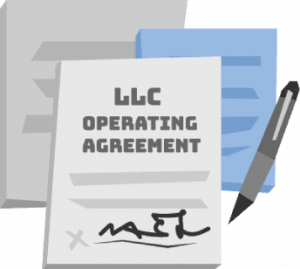How to Start an LLC in Washington
In Washington, you form your LLC by filing the Certificate of Formation and Initial Report with the WA Secretary of State, Corporations, and Charities Division ($190 total). It generally takes between two days and a week for the state to process LLC filings. Here’s how to form your WA LLC.

1. Name Your LLC
First, you have to name your LLC . You can search the Secretary of State Corporations Registration Data Search to see if the name you want is currently in use.
LLC naming requirements in Washington
You can choose any name you want so long as it fits the legal requirements laid out in RCW § 23.95.305. The name must:
- contain an indicator such as limited liability company, L.L.C., or LLC
- not include words like incorporated, limited partnership, or any other words that are reserved for other business entity types
- be unique among business names in Washington
Reserving a business name in Washington
If you’re waiting to start your LLC, you can reserve your business name by filing a Name Reservation form with the Washington Secretary of State for $30. The state will reserve your business name for 180 days.
Getting a Trade Name
A trade name (sometimes called a DBA or assumed business name) is any name other than your LLC’s legal name. You can register a trade name for your business when you file a Business License Application.
Did you hire us to be your registered agent or form your business? Great news! We can file your Washington trade name application for you for just $125 + state fees.
Trademarking your WA LLC name
Forming an LLC doesn’t give you exclusive rights to your LLC name. Another business could still use the name as a trade name. If you want a legal claim to your business name, you’ll need to trademark the name. You can trademark your business name in Washington or go big and register a federal trademark.

2. Claim Your Domain Name
Your domain name opens up a world of options. From launching a website, building social media profiles, setting up email communications, and printing business cards, there’s a whole lot of new-business stuff you can’t do until you choose a domain name.
When you choose your business domain, consider:
-
Does your domain work well with your business name?
-
Is your domain easy to remember and spell?
-
Is your domain available wherever else you want it, like social platforms, trademarks, or business name registries?
Once you have a domain you’re happy with, it’s time to claim it. When you order your domain through Northwest, we’ll also set you up with a website, custom built by our business website experts, hosted and secured through us. You can test drive that website completely free for 90 days.

3. Appoint a Washington Registered Agent
All Washington businesses need a registered agent to accept state and legal mail. You can have a commercial registered agent (a professional registered agent service that has registered its address with the state, like us) or a noncommercial registered agent (a person or business that hasn’t registered its address with the state).
Remember that your registered agent’s name and address will be part of the public record.
WA registered agent requirements
The requirements for a Washington registered agent are outlined in RCW §23.95.455. Your registered agent must:
- Have a physical Washington address.
- Be available during regular business hours.
- Accept legal and state mail on behalf of your LLC and get it to you fast.
Using a registered agent service
A registered agent service offers advantages that being your own registered agent doesn’t. Here’s what you get when you hire a commercial registered agent.
- Privacy. Because registered agents accept service of process (aka lawsuits) for the business, their information goes on the public record. This means if you’re the registered agent for your LLC, your address will be easy to find online. If you work from home, this might be your home address. When you choose us as your registered agent, we’ll let you use our address instead.
- Peace of mind. While it might seem simple to appoint your Uncle Fred as your registered agent, Fred might need to do things like run to the auto-shop or take a sick day. He might even forget about receiving an envelope if he has a busy day. With a professional service, there’s always someone at the office who’s trained to accept and forward your important mail. When you hire Northwest, we send instant notifications and same-day scans of all legal mail.
- Protecting your image. Imagine you’re a customer and you see a business owner get served with a lawsuit at their store or office. It wouldn’t exactly stoke confidence. Having a commercial registered agent lets you receive and open any legal mail on your own time.

4. File Washington Certificate of Formation
The Washington Certificate of Formation is the official document you submit to the Secretary of State to create your LLC.
Online filings ($200) are processed in two days.
Paper filings ($180) are processed in the order they are received.
Required information:
- UBI number. If you already have a Unified Business Identifier (UBI), check yes. Otherwise, select no, and you’ll be given a UBI number when your Certificate of Formation is accepted.
- Company name. Include an indicator like LLC.
- Duration. Indicate whether your LLC will close after a specific time or exist indefinitely.
- Effective date. You may include a future date (up to 90 days) to delay the start of your LLC or select date of filing to start immediately.
- Registered agent. Check the yes box if you’ve appointed a commercial registered agent and list their name here.
- Registered agent address. If you’ve appointed a non-commercial registered agent, list their name, phone number, email address, and physical Washington address here.
- Registered agent signature. Your registered agent must sign the Certificate of Formation.
- Principal address. This must be a physical address—no P.O. Boxes allowed.
- Executor name and address. The person submitting your Certificate of Formation.
Optional:
- Mailing address for the business.
- Mailing address for the registered agent.
- Return address. This is where the state will send confirmation of your filing.
Member-managed vs. manager-managed LLC
In an LLC, the owners are called members. If your business is a member-managed LLC, it just means your owners are the ones calling the shots day-to-day. In contrast, in a manager-managed LLC, the business is run by a manager (or managers) hired by the members. A manager has the powers of a boss, like hiring/firing, opening bank accounts, and signing paperwork.
Learn more about the difference between LLC members and managers.
Expedited processing options
If you file online, the state will process your LLC filing in two days. If you file via paper form, it will be processed in the order it’s received. However, you can rush-order your LLC by paying an expedited processing fee.
Same-day expedited processing costs $100 and is available for both online and paper filings. (If you submit late in the day, your filing may not be processed until the next day.)
Two-day processing for paper forms costs $50.
If you’re submitting a paper filing, enclose the formation fee plus the expediting fee, and write EXPEDITE in bold letters on the outside of the envelope.
Start Your WA LLC Today!


5. File Washington Initial Reports
Washington requires LLCs to file an initial report within 120 days of forming your business. Most of the required information is identical to the information you’ll list on your Certificate of Formation. However, you’ll also need to include:
- Members’ and managers’ names and addresses
- Brief description of your business purpose
Your initial report must be filed with the Washington Secretary of State and requires a $10 filing fee. When you form your LLC with us, we’ll file your WA Initial Report at the same time.

6. Create an Operating Agreement
Ever try to make an important decision in the heat of the moment? Now imagine your whole business depends on you making the right choice. That’s why most LLCs choose to create an operating agreement, so that you can plan for important business decisions before they happen, like distributing profits, entering into a contract, or even selling your company.
You can include whatever you want in your operating agreement, but most people include:
- Members’ initial contributions
- Voting rights
- Management structure
- Distribution of profits and losses
- How to transfer membership interest
- Rules to dissolve the LLC
It’s a good idea to have a lawyer review your operating agreement. You can also use our free, attorney-drafted Washington Operating Agreement templates as a starting point.

7. Get an EIN
An Employer Identification Number (EIN) is sort of like your business’s social security number. It’s a unique nine-digit number given to you by the IRS. It’s used for tax filings, but you may also need it to open a business bank account or apply for a business loan.
You’re legally required to have an EIN if you are a multi-member LLC, have employees, or want to be taxed as a corporation.
If you have a social security number, you can apply for your EIN online. If you do not have a social security number, you can file Form SS-4 by mail or fax or call the IRS. Rather let a professional handle it for you? You can hire Northwest to get your EIN.

8. Next Steps
Once the Washington Secretary of State approves your Certificate of Formation, your LLC is officially formed! What’s next is everything else that comes with maintaining an LLC.
Organize your communications
To talk to vendors, customers, employees, and government officials, you’ll need to have a way for people to get ahold of you. Often, this information needs to go out publically and indiscriminately. To keep your personal information private, you can set up a virtual office to keep things organized, professional, and secure.
Our Washington Virtual Office gives you same-day digital or weekly physical mail forwarding, local phone number to share, and a unique address at our Spokane office.
Don’t need a unique address or phone number? Keep your personal address private and mail secure with Northwest’s Mail Forwarding.
Opening a bank account
It’s crucial to have a business bank account. Why? If you mix your business and personal finances in a single bank account, you could lose the limited liability status LLCs are known for. Without liability protection, your personal assets are at risk if the LLC is sued or defaults on a debt.
To open a bank account for your LLC, you’ll need to bring the following to the bank:
- Your Washington Certificate of Formation (a copy is acceptable)
- The LLC’s operating agreement
- The LLC’s EIN
- An LLC Resolution to Open a Bank Account (if your LLC has more than one member)
It’s a good idea to call your bank ahead of time and find out their exact requirements.
Washington tax requirements
By default, LLCs are taxed as pass-through entities. Instead of the LLC paying taxes directly, LLC income passes through the business to the owners, who report the income on their personal tax returns. LLC income is subject to the federal self-employment tax of 15.3%.
While Washington doesn’t have state income tax, there is a mandatory tax called the Business and Occupation (B&O) tax. This is 1.5% of all gross receipts. So if you make $100,000 in sales, you’ll need to pay $1,500 in B&O tax. Plus, your local Washington city or county might have a B&O tax.
Washington business license
Every LLC operating in Washington state will need a business license. You can apply for yours after you file your Certificate of Formation.
Use the Business Licensing Wizard to apply for the license online or find the forms to download. Online applications take about 10 days depending on the city/state endorsements needed. By mail, it takes up to six weeks to be processed. This license is $50.
Washington Annual Report
Your LLC has to file a Washington Annual Report every year. It is due on the last day of your anniversary month. So if you start your business in January, your annual report is due every year on January 31st. It costs $60 to file your Washington Annual Report. The information is the same as what’s in your initial report—namely, information on your members/managers and a brief description of your business purpose.
GET STARTED TODAY

9. Washington LLC FAQs
Your LLC startup costs include filing your Certificate of Formation ($180 via paper form, $200 via online filing), your Initial Report ($10), and your business license ($50). That means it costs between $240 and $260 to start your LLC.
Opening an LLC can protect your assets because LLCs have limited liability status. LLCs are legally separate from their owners, with separate assets, debts, and liability. So you don’t risk losing your house if your LLC gets sued. To maintain your liability protection, it’s important to keep your LLC finances separate and follow internal policies defined in your operating agreement. Washington also offers over 50 tax incentive programs, some of which are only available for LLCs.
A PLLC is a professional limited liability company. PLLCs offer services in certain licensed fields, like law, medicine, or accounting. PLLCs have additional licensing requirements depending on the occupation.
You can form a Washington PLLC by filing the Certificate of Formation of a Professional Limited Liability Company alongside an initial report with the Secretary of State.
Your operating agreement should have the rules on transferring ownership of your LLC. Typically, this process looks like:
- If a multi-member LLC, vote on the transfer arrangement to get unanimous approval.
- Amend the operating agreement with the new owners’ information.
- If your annual report is due within the next 180 days, you can file your annual report early with the new owners’ information. This costs $60.
- If you are outside of that 180 day window, you’ll file the amended WA Annual Report to update the state on the new owners. This costs $10.
- If you have an EIN, file Form 8822-B to change the responsible party with the IRS.
*This is informational commentary, not advice. This information is intended strictly for informational purposes and does not constitute legal advice or a substitute for legal counsel. This information is not intended to create, nor does your receipt, viewing, or use of it constitute, an attorney-client relationship. More information is available in our Terms of Service.
Ready to Start an LLC in Washington?





